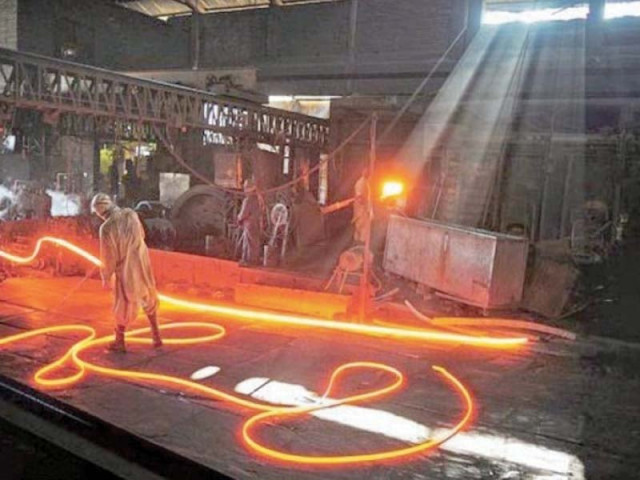PSM to swap 5,774-acre land for Rs99b debt
SSGC, NBP conditionally agree to the deal which requires CCoP nod, Senate panel told

The saga around Pakistan Steel Mills (PSM) continues to take twists and turns. PHOTO: FILE
The Sui Southern Gas Company (SSGC) and the National Bank of Pakistan (NBP) have conditionally agreed to the financial settlement plan, Aziz told the Senate Committee on Statistics and Privatisation. The modalities of the deal would be finalised after approval from the Cabinet Committee on Privatisation (CCoP), he added.
The PSM was closed more than three years ago after the SSGC cut the gas supplies due to non-payment of over Rs44 billion dues. Similarly, the NBP also seeks recovery of Rs55 billion loans advanced to the mills. The employees have also not been paid their salaries for the past few months.
PSM agrees to give 1,500 acres for CPEC industrial zone
A recent report of the State Bank of Pakistan (SBP) revealed that in the last four years – the current tenure of the Pakistan Muslim League-Nawaz (PML-N) government – the debt of the public sector enterprises has jumped from Rs495 billion to Rs1.106 trillion, making a net addition of 123%.
The PSM has a total land area of 19,013 acres, of which 1,950 acres have either been illegally occupied or given on lease to various departments. The PSM has also given 157 acres of its core land to the Port Qasim Authority (PQA), while 1,500 acres have been approved for an industrial park under the China-Pakistan Economic Corridor (CPEC).
Under the current deal, the SSGC and the NBP have been offered 5,774 acres of clean title land of the PSM, which, at the current market value, is almost close to their total outstanding dues, an official of the Privatisation Commission said.
The official, however, said the valuation issue is yet unresolved and the boards of the NBP, the SSGC and the PSM have all yet to give their approvals to the settlement plan.
Ailing steel mill: Govt offers NBP land and SSGC bonds to settle PSM debt
Senator Saleem Mandviwala of the Pakistan Peoples Party (PPP) pointed out that the deal could not go-ahead until the land issue is resolved with the Sindh government, which claims that since the land was given for the industrial purposes it could not be sold or used for other purposes.
Aziz, meanwhile, called for changing the national narrative on the issue of privatisation. He said that these enterprises were no more the national assets and were eating up Rs400 billion annually that could have been spent on the wellbeing of the people.
The minister also criticised the banks for “irresponsible lending” to the loss-making public sector enterprises. He said the PSM could not be turned around despite a Rs76 billion bailout package from the government. The PSM’s total losses, he said, crossed Rs176.6 billion by end of June 2017.
Aziz also said the federal government provided Rs161.5 billion worth of sovereign guarantees to the Pakistan International Airlines (PIA) to keep it afloat. By December 2016, the PIA’s debts swelled to Rs186.5 billion and its accumulated losses amounted to Rs316 billion, he added.
Pakistan Steel Mills directed to sell inventory to settle debt
Senator Mohsin Aziz of the Pakistan Tehreek-e-Insaf (PTI), the chairman of the committee, questioned the PML-N’s privatisation strategy for the past four years. He said instead of privatising the loss-making units, the government conducted capital market transactions of the profitable commercial banks that were already in private hands.
The government undertook a hassle-free job of divesting shares in the capital market instead of getting rid of the loss-making public sector enterprises, he said. The government earned $1.7 billion by offloading its stakes in three commercial banks and the Pakistan Petroleum Limited.
The committee chairman said there were contradictions in the PML-N’s privatisation policy. On the one hand, the government had put power generation companies on the privatisation list but on the other, it was setting up new power plants in the public sector, he added.
The committee directed the Privatisation Commission to submit details of discounts that the government gave on capital market transactions.






1724319076-0/Untitled-design-(5)1724319076-0-208x130.webp)












COMMENTS
Comments are moderated and generally will be posted if they are on-topic and not abusive.
For more information, please see our Comments FAQ